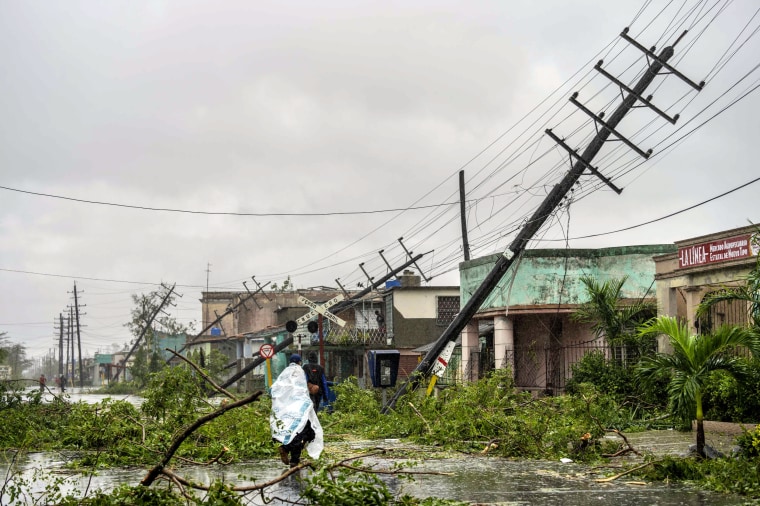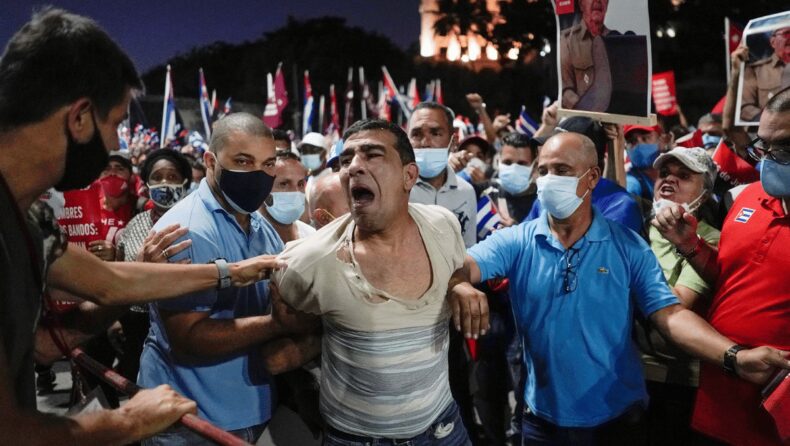Workers restored power to several neighbourhoods in Havana, Cuba on Saturday after a second day of protests over a blackout in the Cuban capital, including the biggest demonstrations since a massive anti-government protests in July 2021.
Repeated blackouts on Cuba’s already fragile electric grid were among the causes of the island’s largest social protests in decades in July 2021. Thousands of people, weary of power failures and shortages of goods exacerbated by the pandemic and U.S. sanctions, turned out in cities across the island to vent their anger and some also lashed out at the government. Hundreds were arrested and prosecuted, prompting harsh criticism of the administration of President Miguel Diaz-Canel.
At least one protest in the West Coast municipality of Praia on Friday evening spread to hundreds, shouting “turn on the lights” and chanting slogans denigrating President Miguel Diaz-Canel. At one point, the group began chanting for freedom, or “libertad” in Spanish, as protesters made their way through a dark, densely populated area that has been without power since Hurricane Ian hit the island on Tuesday.
Small protests erupted again Saturday afternoon in scattered locations in Havana and outside the city, according to social media reports. The demonstrations, which were mostly peaceful, appeared to be taking place only in areas where power had not yet been restored.
Most of the city’s residents, who had power restored, did not protest on Friday or Saturday. “The electricity is coming back bit by bit and that’s a good thing,” said Jorge Mario Gonzalez, a 57-year-old postal worker in Havana, who said power was restored to his home on Friday. . “The government has made a big effort, but it can’t please everyone. We have a lot of problems.”
Earlier this week, Ian knocked out power to 11 million people in the country as it ravaged western Cuba. Officials said that by early Saturday, power had been restored to more than 82 percent of customers in Havana, a city of more than 2 million people, but those still in the dark were growing worried.

Officials said Friday they hoped to have the lights back on in most of Havana by the end of the weekend and by Saturday afternoon. Protests sparked by the blackout have hampered recovery efforts, city officials said, warning of roadblocks and vandalism.
As demonstrations intensified in Praia on Friday night, security forces trucks in black berets clashed with protesters who blocked the main boulevard, preventing marchers from moving forward.
Later, a large number of groups of government supporters, in the capacity of hundreds, were chanting “I am Fidel” — as they refered to the late former leader Fidel Castro — behind the protesters in nearby streets. Many of these men were dressed in pants and T-shirts and armed with clubs, baseball bats and scrap metal. No collisions or arrests were reported.
Street protests are rare in communist-ruled Cuba. On July 11, 2021, the island was rocked by anti-government rallies, the largest of its kind since Castro’s 1959 revolution.
Internet Shutdown in Cuba
Internet communications in Havana were down for a second night Friday when the protests began, leaving cell phone calls and messages unavailable until about 10 p.m. 04:00 Saturday. “In Cuba, the internet goes down again around the same time as the day before,” said Alp Toker, director of Internet watchdog NetBlocks. “This occurrence happening at or around the same time provides another indication that the shutdown is being done deliberately as a measure to suppress coverage of the protests by reducing the connectivity of the citizens.”
The Cuban government did not respond to a request for comment. The electricity supply was suddenly restored in some houses and apartment buildings during the protestors’ march through Praia.
“When people protest, yes, they turn on the lights,” said local resident Andres Mora, pointing to a newly lit building. “But the food for our children and family members gets spoiled, rotten and they have nothing to eat.”
Prolonged power outages in Cuba have been particularly worrisome for many residents, as access to basic goods, including food, fuel and medicine, often means standing in line for hours in the scorching Caribbean sun.
Outside of Havana, much of the island was left in the dark as crews continued to repair poles and power lines and remove trees from roads. The Cuban government has made a rare request for emergency aid to US President Joe Biden’s administration after the hurricane, The Wall Street Journal reported Friday night.













